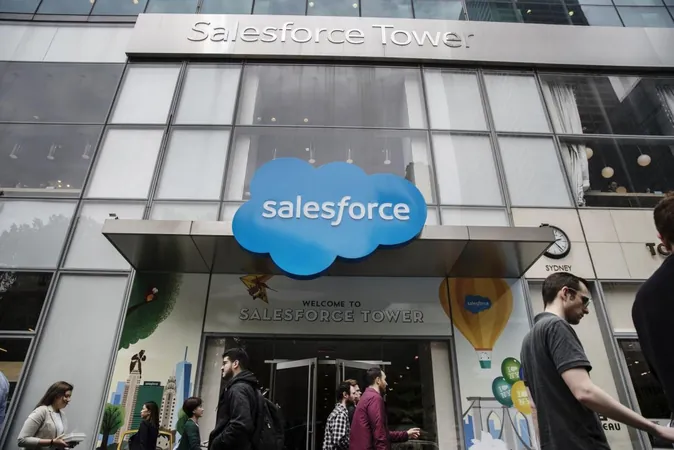
Salesforce’s Groundbreaking AI Strategy: Embrace the Future, But at What Cost to Jobs?
2024-09-17
Introduction
In a bold move this week at its annual Dreamforce conference, Salesforce Inc. revealed a significant shift in its artificial intelligence (AI) strategy, explicitly acknowledging that AI could lead to job losses. The tech giant emphasized its new AI technology as capable of performing tasks autonomously, thereby transforming its pricing model and the nature of work in the corporate landscape.
Salesforce's Evolution in the AI Landscape
Salesforce, known for pioneering the software as a service (SaaS) model, is evolving in response to the rapidly changing AI environment. The company will now charge businesses $2 for each customer interaction facilitated by its advanced AI 'agents.' These agents are designed to streamline customer service, manage appointments, and perform other tasks without human oversight. This pricing strategy serves a dual purpose: it adapts to the potential reduction in workforce size in client companies and positions Salesforce to thrive even if AI integration leads to fewer human employees needing its subscriptions.
CEO Marc Benioff's Keynote Speech
CEO Marc Benioff highlighted in his keynote speech that these AI agents enable companies to scale their operations efficiently during peak times without the necessity of hiring additional staff or relying on gig workers, thus shifting the traditional workforce dynamics.
Challenges Faced by Software Development Firms
Despite the current AI hype, software development firms like Salesforce, Workday Inc., and ServiceNow Inc. have struggled to demonstrate significant revenue growth from their AI initiatives compared to hardware manufacturers like Nvidia and cloud service providers such as Oracle. Even established AI assistants such as Microsoft’s Copilot have fallen short of user expectations, causing hesitation among businesses to invest in similar software upgrades.
Salesforce's Distinct Approach
However, Salesforce is positioning its new AI offerings as a stark contrast to existing tools. The company asserts that its AI products are designed to operate independently, tackling complex tasks far beyond the capabilities of traditional chatbots and AI copilots, which often require human input.
A Departure from Human-Centric AI
The shift from a human-centric to an autonomous AI model represents a departure for Salesforce, as the company previously leaned towards integrating human oversight in its AI systems. This change in approach underscores the growing acceptance of the concept that workplaces may increasingly rely on AI for tasks traditionally performed by humans.
Investment in AI Startups
At Dreamforce, which boasts over 45,000 attendees, Salesforce also announced the launch of a $500 million investment fund aimed at nurturing AI startups, indicating its commitment to leading the charge in AI innovation. Benioff assured the audience that this new technology would deliver high levels of accuracy and security, leveraging Salesforce’s extensive customer data infrastructure.
Impact on Employment in the Tech Sector
While this groundbreaking approach addresses investor concerns about job losses and their impact on the subscription-based SaaS business model, it also raises critical questions about the future of human employment in the tech sector. The conversation around AI primarily revolves around improving labor efficiency, allowing companies to do more with fewer employees. This trend poses a legitimate risk to revenue growth for software companies, as they base pricing on the number of subscribed employees using their products.
Future Scenarios and Reskilling
In light of these shifts, Millham illustrated a scenario where a call center with 5,000 employees might require 30% fewer staff within five years due to AI adoption. While there are calls for reskilling existing workers to take on more complex roles, many companies may opt to rely heavily on AI for tasks traditionally performed by humans.
Conclusion
In a world where AI's potential continues to expand, Salesforce's strategy could redefine the future of work, but as businesses embrace these changes, a significant question remains: what will happen to the millions of jobs at risk? As we stand on the precipice of an AI-driven future, businesses and employees alike must prepare for the looming transformations ahead. Stay tuned as we delve deeper into the implications of these developments—because the future of work may look very different than we ever imagined!


 Brasil (PT)
Brasil (PT)
 Canada (EN)
Canada (EN)
 Chile (ES)
Chile (ES)
 España (ES)
España (ES)
 France (FR)
France (FR)
 Hong Kong (EN)
Hong Kong (EN)
 Italia (IT)
Italia (IT)
 日本 (JA)
日本 (JA)
 Magyarország (HU)
Magyarország (HU)
 Norge (NO)
Norge (NO)
 Polska (PL)
Polska (PL)
 Schweiz (DE)
Schweiz (DE)
 Singapore (EN)
Singapore (EN)
 Sverige (SV)
Sverige (SV)
 Suomi (FI)
Suomi (FI)
 Türkiye (TR)
Türkiye (TR)